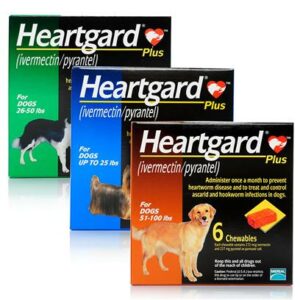Most of us are familiar with the concept of heartworm prevention for our dogs and cats. We give our pets a monthly dose of medication during the warmer months, which protects them from contracting heartworm disease. What many people don’t realize though, is that some heartworm preventatives like Heartgard Plus offer protection from more than just heartworm. Read on to discover more about this preventative and why your pet may benefit from taking Heartgard during the cold months as well.
(Allow 5-10 minutes to read the full post)
Heartworm disease is more common in dogs, but it can also be spread to cats. Animals that have been infected with heartworm disease can pass the disease to more mosquitoes if an uninfected mosquito bites the infected animal. Infected animals cannot spread the disease directly to other animals. Heartworm disease used to be more common in the southern (warmer) states, but the disease has now traveled to the entire United States.
Mosquitoes are usually only present in Minnesota in the warmer months, but pets can still be at risk of heartworm infection in the winter — especially if they travel to warmer states.
Symptoms of heartworm disease in dogs usually progress in stages, starting with an occasional cough. The cough will worsen, and the dog will start to show a reduced tolerance to exercise. Then the dog will start to act more sick, with trouble breathing and sometimes signs of heart failure. If the disease progresses to the final stage, blood flow to the heart can be blocked by a clump of worms in a blood vessel. Heartworm disease at this stage is deadly if the mass of heartworms isn’t surgically removed. Some dogs never develop a blocked blood vessel and instead suffer from organ failure. This is why it is so important to monitor for heartworm disease and start treatment on an infected pet as soon as possible.
Cats are less likely to develop heartworm disease because their bodies do not host the parasitic worms as well as a dog’s body. It is also more challenging to detect heartworm infections in cats, and they sometimes show no symptoms whatsoever. Signs that a cat has heartworm disease are usually less specific, and may include vomiting, lethargy, decreased appetite, and weight loss. Respiratory distress is a symptom of more advanced heartworm disease in cats and signifies lung damage.
There is not an FDA-approved medication to treat heartworm disease in cats. Sometimes medications can manage symptoms, and other times the heartworms can be surgically removed if they are visible on an ultrasound. Unfortunately, surgery is risky and oftentimes there can be serious complications.
The best treatment for heartworm disease is prevention! At House Paws, we recommend Heartgard Plus as a heartworm preventative for all dogs and outdoor cats. Heartgard Plus is a delicious chew made with real beef that also comes in an unflavored version for pets with beef allergies. The chew is given once a month. If an infected mosquito bites your pet and transmits heartworm larvae, the Heartgard Plus will kill the larvae before they reach your pet’s bloodstream.
We also recommend annual testing for heartworm disease for dogs. Our vets use the 4DX test, which screens for heartworm and exposure to three tick-borne diseases and shows results in ten minutes. It’s important to test your dog annually for heartworm disease even if you use a preventative like Heartgard Plus, and especially if you don’t give the preventative year-round. If your dog were to contract heartworm disease while off the preventative, giving a preventative afterwards could actually increase the severity of the disease.
Unfortunately, there is no great test for detecting heartworm disease in cats — blood tests often show false positives and false negatives.
Hookworms and roundworms are usually spread through the feces of an infected animal. Dogs and cats most commonly become infected when they ingest the worms in contaminated stools or when they eat contaminated animals or insects. Pets can also be infected through the skin when they come in contact with infected soil or feces, or by grooming themselves after contact with the worms. If your pet is exposed to the stools of other pets or wild animals, you may want to give Heartgard Plus year-round. A pet can be at risk of contracting intestinal parasites if they have a yard that allows other animals to pass through, if they go for walks in areas where other pets are also present, or if they go to doggy daycare or boarding facilities.
Many preventatives are only available through prescription, including Heartgard Plus. It is only legal in the United States to sell Heartgard Plus if you are a veterinarian or if you are a company with a veterinarian on staff. Heartgard Plus that is purchased from House Paws comes with a guarantee: If your pet were to contract heartworm disease and you can show that your pet was up-to-date on monthly doses of Heartgard, your pet’s treatment costs will be 100% covered by Boehringer Ingelheim, the manufacturer of Heartgard Plus.
(Allow 5-10 minutes to read the full post)
What is Heartworm Disease?
Heartworm disease is a serious health condition spread by mosquitoes that can cause lung disease, heart failure and other organ damage in dogs and cats. Infected mosquitoes carry a parasitic worm (Dirofilaria immitis) that can be transferred to an animal when the mosquito bites it. The worms live inside the animal’s heart, lungs and other blood vessels, where they mature and reproduce.Heartworm disease is more common in dogs, but it can also be spread to cats. Animals that have been infected with heartworm disease can pass the disease to more mosquitoes if an uninfected mosquito bites the infected animal. Infected animals cannot spread the disease directly to other animals. Heartworm disease used to be more common in the southern (warmer) states, but the disease has now traveled to the entire United States.
Mosquitoes are usually only present in Minnesota in the warmer months, but pets can still be at risk of heartworm infection in the winter — especially if they travel to warmer states.
Symptoms
A pet’s symptoms will depend on how long ago the pet was infected, how many worms are inside the pet’s body, and the pet’s activity levels, among other things. Pets who have been infected for a long time or are more active will most likely show more obvious signs of the disease.Symptoms of heartworm disease in dogs usually progress in stages, starting with an occasional cough. The cough will worsen, and the dog will start to show a reduced tolerance to exercise. Then the dog will start to act more sick, with trouble breathing and sometimes signs of heart failure. If the disease progresses to the final stage, blood flow to the heart can be blocked by a clump of worms in a blood vessel. Heartworm disease at this stage is deadly if the mass of heartworms isn’t surgically removed. Some dogs never develop a blocked blood vessel and instead suffer from organ failure. This is why it is so important to monitor for heartworm disease and start treatment on an infected pet as soon as possible.
Cats are less likely to develop heartworm disease because their bodies do not host the parasitic worms as well as a dog’s body. It is also more challenging to detect heartworm infections in cats, and they sometimes show no symptoms whatsoever. Signs that a cat has heartworm disease are usually less specific, and may include vomiting, lethargy, decreased appetite, and weight loss. Respiratory distress is a symptom of more advanced heartworm disease in cats and signifies lung damage.
Treatment
If a dog is diagnosed with heartworm disease, treatment will involve an FDA-approved injection into the pet’s muscles. This is an expensive treatment which requires multiple vet visits, hospitalization, blood tests, X-rays, and several injections.There is not an FDA-approved medication to treat heartworm disease in cats. Sometimes medications can manage symptoms, and other times the heartworms can be surgically removed if they are visible on an ultrasound. Unfortunately, surgery is risky and oftentimes there can be serious complications.
 Prevention with Heartgard Plus
Prevention with Heartgard Plus
The best treatment for heartworm disease is prevention! At House Paws, we recommend Heartgard Plus as a heartworm preventative for all dogs and outdoor cats. Heartgard Plus is a delicious chew made with real beef that also comes in an unflavored version for pets with beef allergies. The chew is given once a month. If an infected mosquito bites your pet and transmits heartworm larvae, the Heartgard Plus will kill the larvae before they reach your pet’s bloodstream.
We also recommend annual testing for heartworm disease for dogs. Our vets use the 4DX test, which screens for heartworm and exposure to three tick-borne diseases and shows results in ten minutes. It’s important to test your dog annually for heartworm disease even if you use a preventative like Heartgard Plus, and especially if you don’t give the preventative year-round. If your dog were to contract heartworm disease while off the preventative, giving a preventative afterwards could actually increase the severity of the disease.
Unfortunately, there is no great test for detecting heartworm disease in cats — blood tests often show false positives and false negatives.
Other Actions of Heartgard Plus
In a northern state like Minnesota, mosquitoes aren’t around all year, and many pet owners choose to stop giving their pets heartworm preventatives during the colder months. But Heartgard Plus protects pets from more than just heartworm disease — it also kills other intestinal parasites, including hookworms and roundworms. These parasites are also dangerous, and can even be passed to humans (unlike heartworms).Hookworms and roundworms are usually spread through the feces of an infected animal. Dogs and cats most commonly become infected when they ingest the worms in contaminated stools or when they eat contaminated animals or insects. Pets can also be infected through the skin when they come in contact with infected soil or feces, or by grooming themselves after contact with the worms. If your pet is exposed to the stools of other pets or wild animals, you may want to give Heartgard Plus year-round. A pet can be at risk of contracting intestinal parasites if they have a yard that allows other animals to pass through, if they go for walks in areas where other pets are also present, or if they go to doggy daycare or boarding facilities.
Why is Heartgard Plus a Prescription-Only Preventative?
With the boom of online shopping, many pet owners try to purchase their preventatives online. We urge all pet owners to only purchase their pet’s preventives from a veterinarian. Online versions of preventatives can be counterfeit and may contain extra ingredients that are not safe for pets. There have been many cases across the country of people selling fake preventatives to pet owners. Pets that are given a counterfeit preventative are unprotected and at risk of getting sick from these unregulated formulations.Many preventatives are only available through prescription, including Heartgard Plus. It is only legal in the United States to sell Heartgard Plus if you are a veterinarian or if you are a company with a veterinarian on staff. Heartgard Plus that is purchased from House Paws comes with a guarantee: If your pet were to contract heartworm disease and you can show that your pet was up-to-date on monthly doses of Heartgard, your pet’s treatment costs will be 100% covered by Boehringer Ingelheim, the manufacturer of Heartgard Plus.






